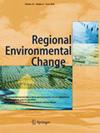Comparison of different modern irrigation system adopters through socio-economic, innovation characteristics and social capital values
IF 3.4
2区 环境科学与生态学
Q2 ENVIRONMENTAL SCIENCES
引用次数: 0
Abstract
Abstract Diffusion of modern irrigation systems is one of the most important objectives of Iranian water policies targeting the sustainable use of water resources to resolve the water crisis. Despite considerable policy support, high subsidization, and a range of benefits, farmers have only minimally adopted modern irrigation systems in most parts of Iran. Therefore, the water crisis persists in almost all parts of the country. Thus, decision makers must recognize why diffusion of these systems has not been successful among farmers despite strong financial and political support. The aim of the current study was to investigate differences between adoption groups of modern irrigation systems and more critically whether the aspects affecting approval were altered by ongoing diffusion prejudiced by policy support. In other words, we explored the postponement of adoption among the early and the later adopters of modern irrigation systems and aimed to identify reasons behind different adoption behaviors. To achieve these aims, we developed a research framework of adoption that integrates multiple theories. In addition to the already established measures (human and physical capital), the current study integrated social capital and technology characteristics. A cross-sectional survey was carried out in Behbahan district in Khuzestan province southwest Iran. A total of 274 farmers were interviewed, of which 100 farmers had not and 174 farmers had adopted modern irrigation systems. A multinomial logit model was applied by using STATA 14 to identify the most effective factors for farmers’ adoption decisions. We distinguished four groups; three consisted of adopters (early, middle, and late adopters) and a fourth group of non-adopters who did not accept modern irrigation technologies. The study found that farmers’ delayed adoption of drip irrigation technologies was due to the complexity of the application process and the availability of family and work social capital. Additionally, the study suggested that improved trust in institutions could increase the likelihood of earlier adoption of these technologies. The results also revealed divergent perspectives among pioneer (early adopters), follower (middle adopter), and laggard (late adopter) farmers regarding the adoption of drip irrigation technologies.通过社会经济、创新特征和社会资本价值对不同现代灌溉系统采用者进行比较
现代灌溉系统的扩散是伊朗水政策最重要的目标之一,目标是可持续利用水资源来解决水危机。尽管有大量的政策支持、高额补贴和一系列福利,但在伊朗大部分地区,农民只最低限度地采用了现代灌溉系统。因此,水危机在该国几乎所有地区都持续存在。因此,决策者必须认识到,尽管有强有力的财政和政治支持,但这些系统在农民中的推广没有成功的原因。本研究的目的是调查采用现代灌溉系统的群体之间的差异,更关键的是,影响批准的方面是否因政策支持的偏见而不断扩散而改变。换句话说,我们探讨了早期和后期采用现代灌溉系统的人推迟采用的原因,旨在找出不同采用行为背后的原因。为了实现这些目标,我们开发了一个整合多种理论的收养研究框架。除了已有的衡量标准(人力资本和物质资本)外,本研究还整合了社会资本和技术特征。在伊朗西南部胡齐斯坦省的Behbahan区进行了横断面调查。总共采访了274名农民,其中100名农民没有采用现代灌溉系统,174名农民采用了现代灌溉系统。利用STATA - 14,运用多项逻辑模型确定影响农民收养决策的最有效因素。我们将其分为四组;三组由采用者(早期、中期和晚期采用者)和第四组不接受现代灌溉技术的非采用者组成。研究发现,农民延迟采用滴灌技术是由于应用程序的复杂性以及家庭和工作社会资本的可用性。此外,研究表明,提高对机构的信任可以增加早期采用这些技术的可能性。结果还揭示了先驱者(早期采用者)、追随者(中间采用者)和落后者(后期采用者)在采用滴灌技术方面的不同观点。
本文章由计算机程序翻译,如有差异,请以英文原文为准。
求助全文
约1分钟内获得全文
求助全文
来源期刊

Regional Environmental Change
环境科学-环境科学
CiteScore
6.80
自引率
2.40%
发文量
125
审稿时长
4.5 months
期刊介绍:
Environmental changes of many kinds are accelerating worldwide, posing significant challenges for humanity. Solutions are needed at the regional level, where physical features of the landscape, biological systems, and human institutions interact.
The goal of Regional Environmental Change is to publish scientific research and opinion papers that improve our understanding of the extent of these changes, their causes, their impacts on people, and the options for society to respond. "Regional" refers to the full range of scales between local and global, including regions defined by natural criteria, such as watersheds and ecosystems, and those defined by human activities, such as urban areas and their hinterlands.
We encourage submissions on interdisciplinary research across the natural sciences, social sciences and humanities, and on more focused studies that contribute towards the solutions to complex environmental problems. Topics addressed include (i) the regional manifestations of global change, especially the vulnerability of regions and sectors; (ii) the adaptation of social-ecological systems to environmental change in the context of sustainable development; and (iii) trans-boundary and cross-jurisdictional issues, legislative and governance frameworks, and the broad range of policy and management issues associated with building, maintaining and restoring robust social-ecological systems at regional scales.
The primary format of contributions are research articles, presenting new evidence from analyses of empirical data or else more theoretical investigations of regional environmental change. In addition to research articles, we also publish editorials, short communications, invited mini-reviews on topics of strong current interest, as well as special features that provide multifaceted discussion of complex topics or particular regions
 求助内容:
求助内容: 应助结果提醒方式:
应助结果提醒方式:


